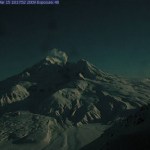Geology
Even if it is only due to repetition almost everyone is familiar with a few geological dates. That the non-avian dinosaurs became extinct about 65 million years ago and the earth is around 4.5 billion years old are figures that are at least familiar to many. (There are a few folks who would prefer to jam the entirety of geologic time into just a few thousand years, of course, but I will not worry over them here.) It truly is wonderful that we have been able to lay out such a detailed map of Deep Time but this was not always so. Today's standard geologic time scale, with all its time…
Geologists have been keeping a close watch on the volcanic activity brewing at Mount Redoubt, the 9,000 foot (2,700 m) volcano found in Alaska's Aleutian Range. In response to the eruption at Redoubt on Thursday morning that released a 65,000 foot (20,000 m) ash column, the Alaska Volcano Observatory raised its Volcano Alert level to "Warning" and its Aviation Alert Level to "Red," both of which are the highest possible categorizations. ScienceBlogger Erik Klemetti from Eruptions is keeping close watch on Redoubt, so pop over to his blog for explosive updates!
Related ScienceBlogs Posts:…
As many of you probably know by now, Alaska's Redoubt volcano has been erupting for several days now. If you're interested in the details, head over to new SciBling Erik Klemetti's Eruptions blog. If you're interested in the latest in really cool pictures, here's one for you:
(Source. Click for full size version)
The picture comes from the Alaska Volcano Observatory (aka place where "something called volcano monitoring" gets done). The ash plume from the eruption is the clearly visible dark smudge near the center of the picture. The image was taken by a weather satellite in…
The question of whether or not I am a geologist is not just an amusing exercise in academic politics. In Washington, as in most U.S. states, geology is a regulated profession; guidelines for who can and cannot call themselves a geologist in a professional context are laid out in the administrative code and enforced by the Geologist Licensing Board.
I am not a geologist, nor will I become one any time soon. To comply with Washington law, I would need to complete coursework in the core subjects of geology (as specified in WAC 308-15-040: structural geology, mineralogy, petrology and sedimentary…
Or, less generally, am I a geologist?
I have a B.S. in geophysics and an M.S. in earth and planetary science with a funky geophysics/geohydrology emphasis. I took some intro physical geology and earth history as a sophomore, but I have never taken formal courses in mineralogy, petrology, structural geology, sedimentology, or stratigraphy. However, I've picked up the basics of these fields from older kids on the street corner and make use of them in my work.
Please assume while you are answering the poll that my work involves using my knowledge of the Earth's history, processes, and…
Sundries.
Warren Buffet is often attributed as saying, "only when the tide goes out do you discover who's been swimming naked" referring to how a bad economy exposes problems in a business. After reading too many comment sections on New York Times articles on the financial crisis, I think it should be "only when the tide goes out do you discover who's a real communist." (Note, dear reader beginning to flame me in the comments, that I didn't say whether I thought this was good or bad or neither good or bad.) Hard economic times really bring out the daggers in economic ideology. I love to…
A recent influx of geobloggers on ScienceBlogs has brought rocks, mountains, and their fiery relatives volcanoes into the spotlight. Whether they're talking about unusual uses of earthquake jargon, volcanic eruptions in the South Pacific, or their fantasy geology curriculum for undergraduates, these bloggers stay down to earth. Remarked veteran ScienceBlogger Chris Rowan of Highly Allochthonous, "All the biomedical types around these parts should wake up and start realizing that the future is hammer-shaped."
Related ScienceBlogs Posts:
The "what should a geology major know" meme
New…
Thumbing a nose at Bobby Jindal, we enthusiastically welcome ScienceBlogs newest addition, Eruptions, written by Erik Klemetti. Erik is a post-doc in igneous petrology, which means he studies how the rocks under volcanoes work. Near daily ]posts on Eruptions profile volcanoes in the news, explaining the science behind the eruptions in terms that non-rock heads can understand. At his old digs, he also did some fantastic analysis of the politics and sociology of relocating an entire town from the danger zone around Chaiten volcano. I'm looking forward to more great posts from Erik, and it looks…
Everyone knows that 1859 was the year in which Charles Darwin's On the Origin of Species by Means of Natural Selection was published, but there was a significant event in September of that same year that is often overlooked. It involved the new understanding that humans and extinct mammals (like sabercats and mammoths) had lived alongside one another in ancient Europe. This may not seem like a particularly controversial point now (who today could imagine "cave men" without mammoths and woolly rhinoceros plodding about the landscape?) but during the first half of the 19th century it was…
African penguins (Spheniscus demersus), photographed at the Bronx Zoo.
An article published tonight in the journal PLoS ONE is forcing scientists to rethink everything they thought they knew about whale evolution.
OK. That's not actually true. But I've got a bet going that "someone" is going to use the phrase "rethink everything" in their story about this find, so better safe than sorry. Plus, it's a way cooler lede than "new whale fossil discovery matches predictions beautifully", even if the mundane description is the one that's just the tiniest bit more accurate.
Seriously, though, a multinational team of authors led by University of Michigan rock star…
We left Darwin in a troubled frame of mind. The fossil record seemed to offer little support to his theory (then again, it offered little support to any other theory). By the time we reach the end of chapter 10, 'On the geological succession of organic beings', he's feeling far more chipper:
"[A]ll the chief laws of palaeontology plainly proclaim, as it seems to me, that species have been produced by ordinary generation: old forms having been supplanted by new and improved forms of life, produced by the laws of variation still acting round us, and preserved by Natural Selection."
What…
Thomas Kuhn -- the one philosopher of science that even ignorami like me have heard of -- said that during periods of 'normal science', researchers only take on problems that they know they can solve. 'Paradigm' is an overused word, but it's a measure of the paradigm-shifting nature of the Origin that in much of it, such as in chapter 9 'On the imperfection of the geological record', Darwin flies blind.
This creates almost as much trouble for the reader as it does for Darwin, as we saw in the previous chapter. The less you can explain, the more you need to describe; where Darwin has cracked a…
Dr. Free-Ride: What have you been learning about in science this school year?
Younger offspring: Lots of stuff.
Dr. Free-Ride: Like what?
Younger offspring: We learned about rocks and minerals. Rocks are made out of minerals, and some rocks have more than one kind of mineral in them.
Dr. Free-Ride: So, what's a mineral?
Younger offspring: Umm ... I think quartz is a mineral. They can cut it in the shape of jewels. And also marble. But I think granite has more than one mineral in it. And we talked about how different rocks are formed.
Dr. Free-Ride: Oh?
Younger offspring: There are some…
tags: earth science, geoscience, nature, streaming video
What does an geoscientist do and how do you become one? The footage on this video is really remarkable [6:38]
tags: continental drift, geology, earth science, streaming video
This video shows how the continents have split apart and drifted around the globe. Further, it also shows their predicted movements in the future [1:20]
When we talk about the role of fossil fuels in climate chance, what we're really talking about is the carbon cycle. That's the term that scientists use to describe the different forms that carbon is stored in on the earth, and the different ways that it can move from form to form. Understanding the carbon cycle is one of the keys to understanding both the effect of burning carbon-based fuels and the issues involved in trying to take carbon dioxide out of the atmosphere. According to a paper in the latest edition of Science, there may still be some pretty significant gaps in our knowledge of…
Since December 26, seismologists have observed over 400 seismic events at Yellowstone National Park—a record number of earthquakes for the hot spot which houses the largest supervolcano in North America. Data is still being analyzed to determine what this "swarm"—a sequence of earthquakes similar in magnitude—could mean. ScienceBlogger Greg Laden will be following the events closely on his blog.
You have already heard that there has been increased seismic activity at Yellowstone National Park over the last few days. Since December 26th, there have been several earthquakes a day, some jut over 3.0 magnitude, in the vicinity of the north side of Yellowstone's lake. This is a seismically active region, but the level of earthquake activity being seen now is much greater than seen in perhaps decades (though the data are still not sufficiently analyzed to make positive comparisons yet).
Volcano experts have absolutely no clue as to what this means. A major reason for virtually total…
... as drawn by the younger Free-Ride offspring.
The Earth as described in 2006:
The moon was going through its phases, the meteor catcher was catching meteors, and the ozone layer, while holey, was still there.
The Earth as described in 2009:
The meteor catcher appears to have been replaced by a large satellite dish. Maybe we have better options with which to handle falling meteors now. (Or maybe we've just prioritized telecommunications.)
Just past the asteroid belt, Mars seems in a very close approach to Earth (possibly because the Mars Rover would appears to be back on Earth -- for…

